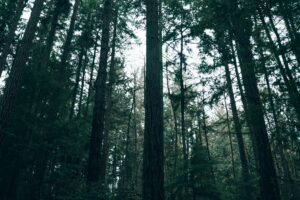Five eggs—large, speckled—with their nest, placed in the ancient niche
at Edingthorpe church.
They don’t make any sound that the human ear can hear. They don’t smell
of anything in particular. I don’t taste them. I don’t touch them.
I place a stone in the great barn the soul has erected, on its leased ground.
I’m a shadow cast by the moon in a cold pass at midnight, far away.
Tenants of matter, rouse yourselves, the war is coming, the war is here.
It crashes softly amid the griefs we have supplied, brought shining
from cross-purposed aspirations, each of which has left its unshod tracks.
I’m not going to speak here, in the presence of these eggs, of this nest.
I’m not going to remember anything
except that single stone that I placed, &, perhaps, its relation to mercy.
It’s a round stone, round as a breath but harder. And it beats like a heart.
It’s not something knowing knows.
It has now, as of this writing, been seven years since those eggs, that nest.
The light, then, intermixed
not with song but with song’s surprise, the surprise
that accompanies song, in its long cloak: here, at last, without its master.
Relations to mercy, see Otherness, see Midnight Apprehensions
(felt or suspected), see
Anthologies, of all that cherishing intended
versus keys we, puzzled, come to find in our pockets, among our things.
It is possible to remember something not experienced in the moment.
The stone, it was smooth & grave, as if it had once met the dawn,
had spoken words only dawn would know, appraised the proper evidence
of things in their places.
The smallest griefs, mis-stowed among the frottage of our vanishings
& which faith, mortal, notes
in its small green book, which it has confected
from twigs & hair, from barley & common soot, & which it leaves open
on the flat roll of the earth’s crust, drawing the incredulous light.
And we climb onto the pages of that open book, or else we do not.
We make our little home there, vowels
crossing off items on the list of all the useless stuff, the temporary stuff,
the maculate cartonnage,
& the griefs listen (for what they can’t hear), they begin to rise
in their ghost-forms from the shapes
we’d assigned them, the strict accommodations
registered in a gilt cursive the dawn recognizes each day, too briefly.
Do they whistle for us? I can’t hear it, if they do. (They might.)
But it’s the war that finds them, burly, bustling through the glass,
certain of the plenty it has conjured:
it leaps toward the eggs (in their nest) like a grammar. It opens its war-
beauty wide. Perhaps it has dreamt of this for a long time now—
& then the silence wipes it away, one more meditation on time & time’s
untimeliness, its unplayed score.
Christ, the presence of this, the eggs, the nest, the barn, the stone,
my own body
at world’s end, this time
making a mural of it, a sort of mural, when it was (as it remains) real.
I hear it now, the sound of the world beginning all over again, saying
Yes &, again, —Yes.
Outside the bluebells enacting the one mystery play they know,
so fervently precarious
the mind breaks out to them, a little, steps forward before pulling back
into itself, recollecting the means by which it manages, at length,
to turn the page.
And the eggs are still. The nest is still. Seven long years now,
the play of faith in which mercy acts, the play of mercy
in which faith steps before the dazzled audience, the curtains drawn
shut behind,
& smiles,
& bows its head (as if in deference or modesty or benediction)
& does not speak, but the light is golden against its hair, its ruddy skin,
thank you, thank you for coming, dear audience,
dear women & men & children, the play is over, yes, & the play is also
just about to begin, are you seated comfortably, is there anything more
we can do for you,
your griefs, we are so glad you brought them,
we have read of them,
be comforted, please be comforted, you have come to the right place,
it’s something you can know, although it is unspeakable,
who put the eggs & the nest here, what their purpose was, what happens
next, the war, the wiping away of war,
take the keys from your pockets & your purses, your traveling bags,
let the light strike against them now (how they glitter, how they glint!)
& let the stone
rejoice, the stone each of you has placed in the great barn of the soul,
the soul’s tithe barn, it’s not a symbol
just as the eggs & the nest are not a symbol but are real, here they are—
move a little closer so that you can see them for what they really are,
you could touch them (but don’t touch them), the five promises
they magnify in the silence of their song (how we wish you could hear
it, the silence we hear!),
& if you must leave now (oh, don’t leave!), come again
to the place we have made for you, that we keep safe for you,
that we hold against the promise of your coming, for when you come.
G.C. Waldrep’s most recent books are feast gently (Tupelo), winner of the William Carlos Williams Award from the Poetry Society of America; The Earliest Witnesses (Tupelo/Carcanet); and The Opening Ritual (Tupelo). Recent work has appeared in American Poetry Review, Poetry, Paris Review, Ploughshares, New England Review, Yale Review, The Nation, New American Writing, Conjunctions, and other journals. He lives in Lewisburg, Pennsylvania, where he teaches at Bucknell University.
Image: Annie Spratt for Unsplash+







